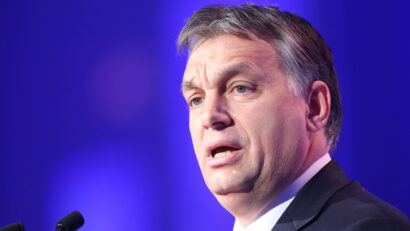EU to build AI gigafactories in €20bn push to catch up with US and China
Detta inlägg post publicerades ursprungligen på denna sida this site Läs mer…
Nyheter och länkar - en bra startsida helt enkelt |Oculus lyx vitae
Detta inlägg post publicerades ursprungligen på denna sida this site Läs mer…

The Hungarian non-profit organization “Direkt36” has proven the importance of investigative journalism: it has uncovered that Viktor Orbán has financed xenophobic online advertising – in the Czech Republic, Poland, Slovakia, Italy, Austria, Germany, and Belgium. Was Orbán trying to influence elections in other EU countries? Evaluations by the “Google Advertising Transparency Center” also point to this.
In autumn 2023, the cabinet office of Hungarian Prime Minister Viktor Orbán apparently placed video advertisements with inflammatory anti-immigration statements on YouTube. The explosive thing about this is that the ads were not only shown in Hungary, but also in seven other EU countries. The xenophobic videos were distributed in the Czech Republic, Poland, Slovakia, Italy, Austria, Germany and Belgium.
This was reported by the Hungarian investigative platform “Direkt36“. Together with VSquare.org, they found out that these ads were viewed between 8 and 9.7 million times by users. This allowed them to draw public attention to Orbán’s alleged election interference.
Did Orbán’s ads influence elections in other EU countries?
At the time the ads were placed, there were election campaigns in four of the seven countries. Slovakia and Poland elected a new parliament in the fall, while Germany and Italy elected new representatives on the municipal level. The advertising placements in Slovakia were particularly intensive. They were displayed between 1.6 and 1.8 million times on screens there. Theoretically, the campaign could have reached around a third of the entire population. The Slovakian government has already reacted to the possible influence:
“As a government and personally as Minister of Defense, I have been informed about the interference of the Hungarian government in the Slovakian electoral system and processes. This also includes the deliberate highlighting of issues such as migration, which was a top priority,” said Jaroslav Naď, Slovakian Minister of Defense from 2020 to May 2023.
The importance of investigative journalism during elections
The content of the promotional videos incites fear of refugees and is reminiscent of videos by the Alt-Right. They were produced in English and can therefore be understood by most of the European population. The suspicion arises that anti-immigration sentiment is being promoted in seven EU countries.
It remains to be seen how this should be dealt with. If Hungary really wanted to influence elections, then extreme caution is required in the EU elections. The work of investigative platforms such as Direkt36 and VSquare is therefore essential for the election campaign period in the upcoming months. Because at a time when we can expect a swing to the right in the European Parliament, only the early exposure of such scandals can ensure fair elections.
This work is licensed under the Creative Common License. It can be republished for free, either translated or in the original language. In both cases, please cite Kontrast / Lena Krainz as the original source/author and set a link to this article on Scoop.me. https://thebetter.news/orban-influences-elections-eu/
The rights to the content remain with the original publisher. Läs mer…

Multinational corporations such as Amazon, Facebook and Apple will now have to pay a minimum global tax of 15%. Even hiding their profits in tax havens won’t help. They will have to pay tax where they generate their profits, not where they produce or where they have their fictitious headquarters. This has been agreed by 138 countries after years of negotiation. This global tax is now coming into force – a “reform of the century” on the road to fair taxation.
OECD countries and the G20 nations have been negotiating global tax justice for more than ten years. In 2021, 138 of the 141 countries agreed on a two-pillar reform; a minimum tax rate of 15% and a tax shift away from the place of production to the place where profits are made. The regulation will come into force in January 2024.
The basic idea is simple. If profits in tax havens are taxed at a higher rate, it pays less for companies to shift their profits there. This won’t only effect stereotypical tax havens such as the Caribbean islands, where there is often no corporation tax at all. Tax havens within the EU, such as Ireland with 12.5% corporation tax or Hungary with 9%, are also set to be hit.
“The principle of paying taxes where profits are generated is gaining acceptance and a common tax rate of 15 per cent puts a stop to destructive downward tax competition,” says Evelyn Regner. The MEP (Social Democratic Party of Austria) has been campaigning for fairer taxation of corporations at the European level for years.
Despite criticism that China and the USA are not on board, and that a global tax rate of 15% is too low, there has never been a comparable regulation before.
“For the first time in the history of taxation, states are being given the right to tax profits generated in other states according to agreed rules,” write tax experts Prof Dr Deborah Schanz and Dr Ulrike Schramm.
A MINIMUM TAX RATE OF 15 % COULD BRING IN AN ADDITIONAL 220 BILLION DOLLARS
The minimum tax rate will apply to all groups with an annual turnover of more than 750 million euros – regardless of whether the parent company or only one subsidiary is based in an EU member state. This affects around 7,000 to 8,000 companies worldwide and, according to OECD calculations, is likely to generate around 200 billion dollars in additional taxes.
For Austria, the tax office is expecting 100 million euros in additional revenue from 2026. According to economist and head of the tax department at the Vienna Chamber of Labour, Dominik Bernhofer, this could even amount to 200 to 300 million euros per year. In the long term, it could be even more, as there will be less profit shifting and tax competition. Together with his colleague Professor Matthias Petutschnig from the University of Vienna, Bernhofer looked at 19 of the largest Austrian companies. These include the cardboard group Mayr-Melnhof, banks such as Erste Bank and Raiffeisen, Vöst and Andritz. According to them, these 19 companies alone would have to pay a good 130 million euros more per year.
AUSTRIAN PEOPLE’S PARTY REPEATEDLY OPPOSED TRANSPARENCY DIRECTIVES AT EU LEVEL
Conservative and liberal governments in Europe have been resisting tighter taxes for corporations for years. The Irish government, for example, once declared that it did not want Apple to pay any back taxes, even though this would be necessary under EU law. Austria’s Austrian People’s Party (ÖVP) finance ministers are also taking part in the blockade games. Back in 2018, the then ÖVP Finance Minister Löger blocked tax disclosure by large corporations at EU level. His predecessor Schelling – also ÖVP – also blocked the EU’s planned financial reporting obligation for large corporations in 2016.
The Austrian parliament decided in 2019 that Austria should campaign for more transparency and tax disclosure, no matter who is finance minister in the future. Despite this decision, Austria abstained from another vote at EU level in 2021, once again preventing a push for greater tax transparency. The Finance Minister at the time was Gernot Blümel (ÖVP).
This work is licensed under the Creative Common License. In case of new republication, please cite Kontrast.at/Ingo Geiger as the Source/Author and set a link to the article in English: https://thebetter.news/global-minimum-tax-rate/
The rights to the content remain with the original publisher. Läs mer…

The EU-Parliament passed a law to regulate cryptocurrencies like Bitcoin more strongly. The new regulation will protect consumers from losses, and it will make money laundering and terrorist financing more difficult. In addition, providers are to be held liable in the event of massive losses. With the new law, Europe wants to end the “wild west of the blockchain world”.
On 20 April, the EU-Parliament passed the so-called “Regulation on Markets in Crypto Assets” (MiCA) with a large majority. Until now, it was possible to trade cryptocurrencies largely anonymously. Bitcoin & Co. are therefore popular with money launderers and fraudsters. This is now to come to an end.
Crypto exchanges will be subject to national supervisory authorities
Insider trading and abuse of power are to be made more difficult by the regulation. Service providers and suppliers of crypto-assets must submit to money laundering regulations. In addition, platforms and crypto exchanges will be subject to national supervisory authorities. Those platforms on which cryptocurrencies can be traded must also provide information about the sender and recipient of the transactions.
This is the first law to comprehensively regulate cryptocurrencies such as Bitcoin, Etherum, etc. Evelyn Regner, Vice-President of the EU Parliament, comments on the decision:
“With this law, we are not only creating a model for the regulation of crypto markets, but above all strengthening the protection of consumers and investors and increasing legal certainty for providers.
EU Regulation on Cryptocurrencies makes money laundering and terrorist financing more difficult
At the same time, the regulation ensures that trading with Bitcoin & Co. can be better tracked. Suspicious transactions that are related to money laundering or terrorism, for example, can thus be identified more quickly.
“This is long overdue, because under the guise of innovation, cryptocurrencies are often a convenient way to cover up criminal money flows. A whole 22 billion euros were laundered through crypto assets in 2022. This must now be put to an end,” Regner said.
The regulation is to come into force in stages from 23 June. From July 2024, crypto-assets tied to currencies – so-called stablecoins – will then have to prove larger financial reserves in order to be approved. The complete regulation will then come into force in January 2025 at the latest. The “Wild West of the blockchain world” will thus come to an end, according to European Parliament member Stefan Berger.
Bitcoin mining consumes as much energy as the whole of Austria every year
However, Regner points out that the EU’s regulation on cryptocurrencies is only a first step: “However, not all the work is done with the regulation adopted today, because crypto markets continue to develop rapidly. Therefore, the EU Commission should continue to closely monitor developments in the crypto asset markets and propose further regulation if needed.”
Especially in the area of sustainability, it is imperative to tighten up: “Bitcoin mining alone consumes as much energy annually as the whole of Austria. Therefore, in the future, we will also need minimum standards for sustainability, which have not made it into the regulation for the time being due to considerable resistance from the centre-right.” Läs mer…

The European Council, the Commission and the Parliament have agreed on the main points of the new EU Pay Transparency Directive. The directive aims to end the pay gap between women and men. In the future, companies with more than 100 employees will have to publish average salaries for the same work or work of equal value. Gender pay gaps must be eliminated in cooperation with social partners. Otherwise, there is a threat of fines.
“Today is a good day, not just for women, but for all workers,” says Evelyn Regner, vice president of the EU Parliament. She has fought for years for the EU directive for pay transparency. In December, the European Council, the EU Commission and the Parliament have now agreed on the most important points of the directive. An essential step, because in Europe, women still earn on average 14 percent less than men in comparable positions.
Employees gain insight into wage levels
Above all, a lack of transparency makes it difficult to reduce the gender pay gap. It is considered one of the main obstacles. The new directive aims to change that. In the future, all employees of a company will be able to see the wage structures of their colleagues—at least for people who do the same or comparable work. It does not matter how large a company is.
[embedded content]
Information about individual wages or the average wage for the same or comparable work forms the basis for fair pay regardless of gender. After all, this is the only way to make discriminatory wage differences visible and correct them through complaints or legal action.
“With the new law, we have made good progress towards reducing the gender pay gap and ensuring that all employees in Europe receive the same pay for the same work or work of equal value” Evelyn Regner, Vice President of the EU Parliament.
Companies must disclose any wage differentials between male and female employees
Companies with more than 100 employees must make wage structures publicly available and report them to a monitoring body. It must be made clear whether there are differences or pay gaps between the sexes.
If the wage gap exceeds 5 percent, the company must develop and implement measures in cooperation with the social partners (e.g., employee representatives, trade unions). However, only if the difference cannot be attributed to objective factors.
The disclosed data will make cross-industry comparisons possible. This will make the full extent of wage inequality (even) more visible. This will also increase awareness of the problem for employers and employees.
Penalties and sanctions for violating the EU Pay Transparency Directive
The directive places greater responsibility on individual companies and EU member states. They must publish wage data, make it available to the public and the workforce, and report it to a monitoring body. In the event of violations, the companies concerned face fines. These are to be set and enforced by the member states.
The newly gained transparency gives employees the opportunity to stand up for their rights from the outset. Companies that pay women and men unequally will have a harder time in the future.
HR managers are no longer allowed to ask about applicants’ current salaries.
Wage inequality often begins in the job interview. Applicants are asked about their current salary, which then serves as the starting point for negotiations. This deepens gender pay gaps. With the new directive, HR managers will no longer be allowed to do this.
The EU-Parliament also agreed on a new directive to give platform workers more rights. Including minimum wage, social security and paid vacation. Läs mer…